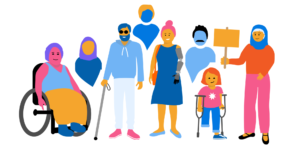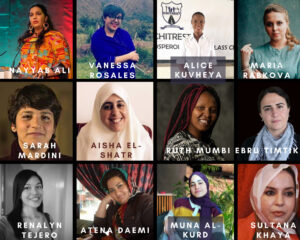Last week, my team had the privilege of meeting with human rights defenders with disabilities from Georgia. They shared deeply concerning information about their exclusion from discussions surrounding the Law on Transparency of Foreign Influence. I have raised my concerns about the law with the Georgian government and expressed them publicly in recent weeks.
The defenders highlighted that HRDs (human rights defenders) with disabilities have repeatedly been told they would not be affected by the law. From my country visit, however, I know this not to be true. HRDs with disabilities face additional challenges in accessing funding, and foreign funding is crucial in allowing them to carry out their vital work.
The defenders also informed us that no explanatory videos regarding the draft law have been translated into sign language, further excluding a large number of people with disabilities.
As explained through specific examples during the meeting, when defenders expressed a desire to attend committee hearings where the proposed law was set to be discussed, they were often asked to call an official and received no specific response until the last moment, when they were told there was no room left for them. While some representatives of human rights NGOs reportedly participated in these hearings, the community of people with disabilities was largely excluded. One participant noted, “We had important points to make about the law.” Another stated: “It was so frustrating that they just tried to suppress our voices.”
As a result, the primary means for HRDs with disabilities to express their opposition to the proposed law has been through social media activism and participation in protests. One defender stated, “We wanted to do it to show we are here.” However, they faced additional challenges, including online harassment by trolls and bots who left offensive comments and portrayed them as misunderstanding the issues, targeting them specifically for their disabilities and activism.
The meeting underscores a broader pattern of exclusion of Georgian human rights defenders with disabilities from important discussions affecting them that I have been made aware of in recent months, which is deeply concerning. It also reveals significant flaws in the legislative process surrounding the adoption of the law.
I call on Georgia’s parliament to drop the law instead of attempting to override the President’s veto.
I remind the government of Georgia that the issue of inclusion must be addressed to ensure that all voices, including those of HRDs with disabilities, are heard and considered in legislative processes and any policy discussions concerning them and people whose rights they defend.
What follows are a series of video statements from Georgian disability rights defenders, in which they share their perspectives on the proposed Law on Transparency of Foreign Influence. The transcripts of their statements, in Georgian, are also included.
The defenders discuss the current situation for people with disabilities and highlight the importance of advocating for their rights. They emphasize that international funding is essential for ensuring that their human rights advocacy remains independent and can stay vocal.
The defenders also address the stigma introduced by the law and criticize the government’s double standards regarding foreign funding, depending on the recipient. They point to the transparency of their projects and suggest that if the aim is truly more transparency, there are less stigmatizing ways to achieve it.
1. Mari Korkotadze
Watch on Facebook: https://www.facebook.com/socialjustice.org.ge/videos/3719670054949691
შეიძლება ვიღაცას მოუნდეს და დამასმინოს იმიტომ, რომ არ მოეწონოს ის კრიტიკა, რომელიც მე მექნება სახელმწიფო მოხელეების მიმართ. აი, მაგალითად, ჩემს შვილს აქვს აუტიზმი. როდესაც სახელმწიფო არღვევს შეზღუდული შესაძლებლობის მქონე ბავშვების და ზრდასრული ადამიანების უფლებებს, მე ამას ყოველთვის ვაპროტესტებ, ვამონიტორინგებ ხოლმე ამ სიტუაციას და ხშირ შემთხვევაში მიწევს ხმამაღლა, საჯაროდ, კონკრეტულ პრობლემებზე საუბარი. სახელმწიფოს კი ყოველთვის გამოვყავართ ასე, რომ აი… ამასწინათ, მაგალითად, იყო ესეთი საუბარი, რომ შშმ თემის პოლიტიზირებას ახდენს ზოგიერთი შშმ აქტივისტი. ძალიან გაოცებული დავრჩი ამ გამონათქვამის გამო, იმიტომ, რომ ყველაფერი, რაც შშმ პირს ეხება, წყდება პოლიტიკის დონეზე, ხომ? – აბსოლუტურად ყველაფერი. და ანუ რა? ჩვენ პირდაპირ გვეუბნებიან, რომ პოლიტიკაში არ იყოთ ჩართულები. რომ ჩვენს ნაცვლად მათ გადაწყვიტონ, ჩვენ რა გვინდა.
ჩვენ ვართ ძალიან ძლიერი თემი. ეს სიძლიერე ჩვენ გვაქვს მიღებული საერთაშორისო დონორების დიდი მხარდაჭერით და რომ არა ისინი, თემი ვერ იქნებოდა ისეთი ძლიერი, როგორიც დღეს ვართ. შეგიძლია, შენ დაფინანსება მოიპოვო სახელმწიფოს მხრიდან. მაგალითად, რამე სერვისი შექმნა და დაგაფინანსოს სახელმწიფოს რომელიმე უწყებამ, მაგრამ ეს ავტომატურად ნიშნავს იმას, რომ შენ ისე უნდა მოიქცე, როგორც სახელმწიფო გიკარნახებს. ანუ, შენ ვეღარ ხარ დამოუკიდებელი, ვეღარ ხარ თავისუფალი და როდესაც რამე არის გასაპროტესტებელი, ვეღარ აპროტესტებ. ფაქტობრივად, ხელ-ფეხი გაქვს შეკრული; იმიტომ, რომ შენ რომ ხმა ამოიღო, აუცილებლად დაკარგავ იმ ფინანსებს და ამიტომაც არის მნიშვნელოვანი საერთაშორისო დაფინანსება, რომ შენ არ იყო სახელმწიფოზე დამოკიდებული ფინანსურად, რომ იყო ყოველთვის თავისუფალი, იყო ყოველთვის ხმამაღალი და ყოველთვის გქონდეს შესაძლებლობა, გააპროტესტო ის, რაც არის უსამართლო.
ამიტომ ჩვენ არავითარ შემთხვევაში არ დავუშვებთ, რომ აი ეს მონაპოვარი ვიღაცამ წაგვართვას და დაგვაბრუნოს იქ, როდესაც შშმ ადამიანები სახლში ჰყავდათ გამოკეტილი ოჯახის წევრებს, იმიტომ, რომ მათი გამოშვება და აღიარება, რომ მათი შვილი შშმ ადამიანია, ამის აღიარებისაც რცხვენოდათ. სწორედ ამიტომ, არა რუსულ კანონს.
2. Esma Gumberidze
Watch on Facebook: https://www.facebook.com/socialjustice.org.ge/videos/983441230034198
იმხელა სტიგმა იქნება, რომ, მაგალითად, შეიძლება თანასოფლელებმა, მეზობლებმა, ახლობლებმა, უთხრან ოჯახებს, რომ თავიანთი შვილები, შშმ პირები, რომლებიც ისედაც სახლებში არიან ჩაკეტილები, არ ატარონ “შპიონების” დაფუძნებულ ორგანიზაციებში.
სახელმწიფოს თუ არ მოეწონება ჩვენი აზრი, ძალიან მარტივად გვეტყვიან, რომ თქვენ შშმ პირების სახელით კი არ საუბრობთ, არამედ ატარებთ უცხო ძალის ინტერესებს. ამით, ნებისმიერ ჩვენს აზრს ნიველირებას გაუკეთებენ. სხვადასხვა საკონსულტაციო საბჭოს წევრი ვარ, მათ შორის, მთავრობასთან, შინაგან საქმეთა სამინისტროსთან, იუსტიციის სამინისტროსთან, თბილისი მერიასთან. ყველგან ამბობენ, რომ, მაგალითად, ჩვენ რომ ვითხოვთ, ჩავატაროთ ექიმების, პოლიციელების, ნოტარიუსების ტრენინგები, რომ როგორ იმუშავონ შშმ პირებთან, რომ უსინათლოს აქვს ხელმოწერის უფლება დამოუკიდებლად, მაგალითად, ხომ? ისინი, სახელმწიფო მოხელეები, გვეუბნებიან, რომ ჩვენ არ გვაქვს ამისთვის ბიუჯეტში ფული და იქნებ დონორი მოგვაძიებინოთ.
2024-2026 წლების ადამიანის უფლებათა სამთავრობო სამოქმედო გეგმაში, ძალიან ბევრ რამეზე წერია, რომ დაფინანსების წყარო არის უცხო დონორი, მათ, შორის, USAID, EWMI, EU, და სხვა დონორები. ანუ, თუ სახელმწიფოს აქვს უფლება, რომ მათ დაფინანსებას დაეყრდნოს და ეს არ არის უცხო ძალის ინტერესები, მაშინ, რატომ არ გვაქვს უფლება, ჩვენ, მოქალაქეებს, რომ ამავე დაფინანსებას დავეყრდნოთ?
3. Ana Sikhashvili
Watch on Facebook: https://www.facebook.com/socialjustice.org.ge/videos/7361733303921794
სად იგრძნობა უცხოური გავლენა იმაში, პირობითად მე რომ ხელჯოხით გადაადგილება ვიცი, ხომ? ანუ აქ, რომელი გერმანელის ან პოლონელის ინტერესი ტარდება, მე რომ თეთრი ხელჯოხი მიჭირავს? ისევ და ისევ ჩვენი ქვეყნის მოქალაქის ინტერესი არის. რაც შეეხება გამჭვირვალობას, თუ რაიმე პროექტში ვყოფილვარ ხოლმე ჩართული, თუნდაც დონორები ყველგან იმდენად დეტალურ ანგარიშებს ითხოვენ ხოლმე, რაში რა იხარჯება, რომ მე მგონია, ამას დამატებითი გამჭვირვალობის მექანიზმი აღარ სჭირდება. მაგრამ თუ სჭირება რაიმე დამატებითი მექანიზმი, ამისთვის უამრავი სხვა გზა და მეთოდი არსებობს, რომ გაკეთდეს და სულაც არ არის საჭირო, რომ ვიღაცას უცხოური ინტერესის გამტარებელი დავარქვათ.
თუ რაიმე საკონსულტაციო საბჭო არსებობს სახელმწიფო უწყებების დონეზე, მათი შეხვედრებიც კი ფინანსდება ჩვენი უცხოელი დონორების მიერ. და იქ მერე, თუ ანგარიში ან სამოქმედო გეგმა იწერება, მითუმეტეს მათი ჩართულობით და მხარდაჭერით კეთდება. ხოდა წარმოიდგინეთ, თუ ეს ყველაფერი გაქრება, გამოდის, რომ ისედაც ჩახრშობილი ხმა უფრო მეტად ჩაიხრშობა და აღარ გვექნება შესაძლებლობა, რომ ჩვენი ინტერესები გატარდეს.



